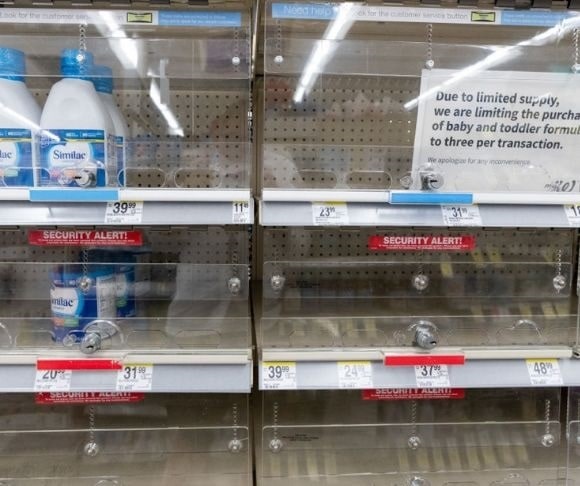
(Bill Clark/CQ-Roll Call, Inc via Getty Images)
Perhaps the classic Sophocles quote needs an update to reflect the present hardship Americans face today: It is better to have never been born than to suffer from rampant inflation and ubiquitous shortages. Indeed, what a terrible year it is in which to be born. High prices will be a fixture in the US economy for years to come. Children today will be saddled with trillions of dollars in new debt by the time they start paying taxes. Babies cannot even get fed because the government made a catastrophic error that resulted in shortages of popular infant formula from Abbott Laboratories.
A Race Against Time
Abbott Laboratories recently announced that it had suspended production of its EleCare specialty formula following a series of severe storms and heavy rains in southwestern Michigan that flooded areas of its Sturgis plant. Abbott confirmed to the US Food and Drug Administration (FDA) that the incident would likely postpone the production and distribution of this vital product for several weeks.
The largest US supplier of powder infant formula noted in its statement that it had enough inventories to meet demand until new items were available on shelves. “Abbott has ample existing supply of EleCare and most of its specialty and metabolic formulas to meet needs for these products until new product is available,” the formula maker noted.
Still, this is concerning news as it comes just one week after the company reopened the facility to help curtail the nationwide crisis that triggered panic among parents of newborn children. Abbott had struck a deal with the FDA to reopen the factory, informing regulators that it would prioritize the production of the amino acid-based, hypoallergenic formula.
Although the development is a blow, FDA Commissioner Robert Califf remains optimistic that the situation could soon be resolved. “While this is an unfortunate setback and a reminder that natural weather events can also cause unforeseen supply chain disruptions, I want to reassure consumers the all-of-government work to increase supply means we’ll have more than enough product to meet current demand,” he tweeted. “Making sure that parents and caregivers have access to both safe and available infant formula remains a top priority for the FDA, and our teams are working night and day to help make that happen.”
Operation Fly Formula
The White House revealed on June 15 that a seventh mission for “Operation Fly Formula” is underway, helping to distribute the shipment of about 548,000 eight-ounce bottle equivalents of Nestlé Alfamino® and Alfamino®Junior specialty infant formula this week. Nestlé’s formula equal to about 44,000 pounds will be shipped from Switzerland to Kentucky.
Not everyone will be able to access the latest shipments. The products will be given mostly to hospitals, and Women, Infants, and Children (WIC) programs across the US. But more deliveries will be announced next week.
In addition, more than four million pounds of base infant formula powder will be sent to the US from Reckitt’s facility in Singapore. The news came soon after the FDA proffered Mead Johnson Nutrition, a division of Reckitt, approval to import the powder, which will be used for nearly six million cans of Enfamil Stage 1. This is equal to about 66 million full-size eight-ounce bottles.
The FDA has eased import restrictions, giving priority to companies that can prove their nutritional content and ingredients simulate US standards. This has prompted more brands to ramp up output to fill the supply gap.
Formula of Bad Economics
In the short-term, there were three primary culprits for the national baby formula shortage fiasco: Abbott, for some type of bacteria in its formula, the FDA, for managing it badly, and the administration, for not responding until it was too late.
That said, this has been an issue festering that would have inevitably triggered a calamity affecting millions of babies. Scott Lincicome, the director of general economics at the Cato Institute, recently told Congress that poor federal trade policies fostered this mess, including facilitating Abbott’s market dominance, which controls about 90% of the domestic formula supply.

(Bill Clark/CQ-Roll Call, Inc via Getty Images)
“I’ve been looking at supply chains for the last two plus years … and I haven’t seen an industry this fragile,” Lincicome said. “It is about a textbook case of what happens when you put walls around the country and block all the imports, and then have a government contractor as a monopsonist in the market … it’s a perfect storm for problems.”
As Liberty Nation’s James Fite reported in May, the Biden administration unveiled multiple measures to reverse the chaos, including cutting red tape and increasing imports. But if this is the panacea, why could this have not been the standard policy in Washington? Moreover, as LN also noted, government benefits to domestic producers and the federal Special Supplemental Nutrition Program for Women, Infants, and Children added to these woes.
“The government is hard at work ‘fixing’ a problem it created,” Fite averred.
Unintended Consequences
One of the most fundamental principles of economics is that when you subsidize something, you get more of it. So, when Washington is extending special privileges to massive corporations – in this case producing, infant formula – the marketplace is going to be flooded with these brands’ products rather than alternatives from smaller outfits or foreign competitors. An essential element of public policymaking is to make promises without admitting costs, requiring additional promises to cover for the mistakes made by the initial pledges, which spark their own consequences. Unfortunately, babies are the ones bearing the brunt of the incompetence of politicians and regulators. The marketplace is too important to be left to the politicians.
Remember to check out the web’s best conservative news aggregator
Whatfinger.com — the #1 Alternative to the Drudge

